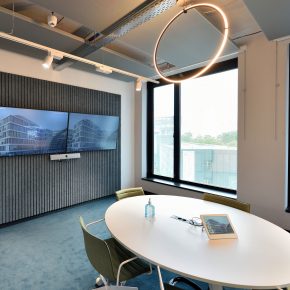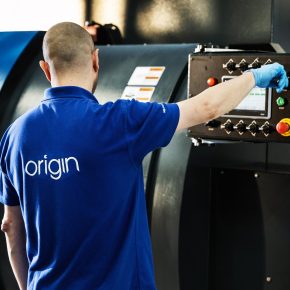
Troldtekt: Circular construction requires effort every step of the way
The construction industry cannot minimise its way out of the climate crisis. There is a need for buildings with a low carbon footprint – and for healthy, durable materials which can create value in new cycles. Troldtekt A/S has interviewed frontrunners of the circular economy for an online feature. They point to data and more respectful consumption of resources as some of the keys to more balanced construction.
‘It will take more than just efficiency enhancements and process optimisation for us to achieve our goal of sustainable building’.
This is the message from the well-known Dutch architect Thomas Rau, who established RAU Architects, and in 2013 was named Architect of the Year in the Netherlands. The transformation he is calling for fundamentally changes our role as humans on Planet Earth.
He adds: “The biggest misconception is that we think we have to build buildings. In future, buildings will be a product of a logistics process.
“In the same way, raw materials will not be raw materials either, but nature’s works of art or limited editions, and in future we will need to regard buildings as repositories of such ‘limited editions’.”

Healthy materials and the need for data
Martha Lewis, Head of Materials at leading architectural firm Henning Larsen, points to the vital importance of healthy materials and comprehensive data.
“Data increase the value of building materials in the circular economy. Information about the building materials is entered in material passports, so we know, for example, how many times an acoustic panel has been painted – and with what. The information from the material passports is transferred to a building passport that keeps track of any new materials that come into the building, and what happens to the materials which are already there,” she says, adding that the material manufacturers have an important role to play in this respect.
“It’s very valuable that a company like Troldtekt has EPDs for most of their products. In fact, it’s crucial, because in the building industry we need to know more about the climate impact from the production of building materials, and the EPDs provide this information.”
In early 2023, at the Circular Build Forum, the Danish construction industry’s new material passport was presented. The material passport declares important information about construction products – for example, have chemicals or anything else been used in production that may be of relevance when assessing whether a product can form part of a circular economy in new buildings.
EPDs ensure transparency
Troldtekt works with a range of sustainability initiatives in the production of acoustic panels – and environmental product declarations (EPDs) are a key tool here.
The environmental impact of raw materials, transport, production, use, disposal and the potential for recycling are reflected in the life cycle analysis on which the EPDs are based. Accordingly, the EPDs are a useful tool for consultants and clients when gathering and assessing documentation about building materials.
Vibeke Pedersen, Head of Engineering Department at Troldtekt A/S, comments: “Transparency and thoroughness have been keywords for us in working with our EPDs. Among other things, we have chosen to have separate EPDs for our various products rather than just working with average values.”
Cement type with reduced carbon footprint
In an interview with the cement manufacturer Aalborg Portland’s CEO Michael Lundgaard Thomsen, he looks behind the scenes at the development of the new FUTURECEM™ cement type, which has a 30% lower carbon footprint than conventional cement. Since early 2022, it has been possible to choose Troldtekt acoustic panels based on FUTURECEM – and the panels have carbon footprints that are 26% and 38% lower than those of Troldtekt based on grey and white cement, respectively, measured throughout the entire life cycle of the acoustic panels.
Visit the new online feature about sustainable building with even more information!
Latest news

21st November 2024
Altro distils style and performance at English Spirit
English Spirit Distillery has used an extensive package of Altro products front and back of house, in their new visitor centre café, shop and viewing area for the working distillery.
Posted in Articles, Bathrooms, Bedrooms & Washrooms, Building Industry News, Building Products & Structures, Building Systems, Case Studies, Floors, Interior Design & Construction, Interiors, Kitchens, Restoration & Refurbishment, Retrofit & Renovation, Timber Buildings and Timber Products, Walls
21st November 2024
Abloy UK creates bespoke locking solution for Secure Information Boxes
Abloy UK has supplied The Safety Letterbox Company Ltd with a bespoke Sentry CL811 Camlock for use in its Secure Information Boxes, assisting life safety and complying with new regulations and legislation for high rise buildings.
Posted in Access Control & Door Entry Systems, Architectural Ironmongery, Articles, Building Industry News, Building Products & Structures, Building Regulations & Accreditations, Building Services, Case Studies, Facility Management & Building Services, Health & Safety, Posts, Restoration & Refurbishment, Retrofit & Renovation, Security and Fire Protection
20th November 2024
CUPA: CUPACLAD enhances hotel aesthetics with a creative natural slate façade
Situated at the northern edge of a newly developed retail park near Bristol, the Abbey Wood Travelodge was conceived as part of the company’s new Budget-Luxe line of hotels – it features CUPACLAD, from CUPA PIZARRAS.
Posted in Articles, Building Industry News, Building Products & Structures, Building Systems, Case Studies, Cladding, Concrete, Cement, Admixtures, Facades, Posts, Restoration & Refurbishment, Retrofit & Renovation, Walls
20th November 2024
Origin launches in-house powder coating facility
Origin’s latest investment is set to redefine industry standards as it launches its own in-house powder coating facility.
Posted in Aluminium Products, Articles, Building Industry News, Building Products & Structures, Building Systems, Doors, Glass, Glazing, Innovations & New Products, Paints, Coatings & Finishes, Restoration & Refurbishment, Retrofit & Renovation, Site Preparation, Windows
 Sign up:
Sign up: